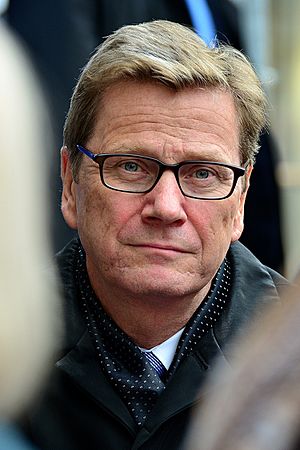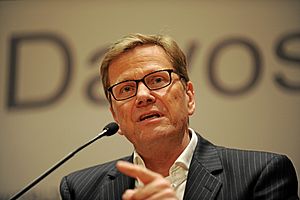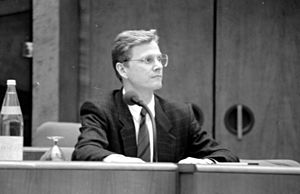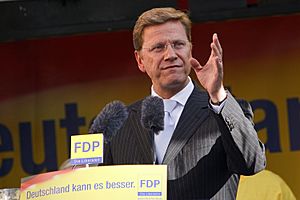Guido Westerwelle facts for kids
Quick facts for kids
Guido Westerwelle
|
|
|---|---|

Westerwelle in 2013
|
|
| Vice Chancellor of Germany | |
| In office 28 October 2009 – 16 May 2011 |
|
| Chancellor | Angela Merkel |
| Preceded by | Frank-Walter Steinmeier |
| Succeeded by | Philipp Rösler |
| Minister of Foreign Affairs | |
| In office 28 October 2009 – 17 December 2013 |
|
| Chancellor | Angela Merkel |
| Preceded by | Frank-Walter Steinmeier |
| Succeeded by | Frank-Walter Steinmeier |
| Leader of the Free Democratic Party | |
| In office 4 May 2001 – 13 May 2011 |
|
| General Secretary |
Cornelia Pieper Dirk Niebel Christian Lindner |
| Preceded by | Wolfgang Gerhardt |
| Succeeded by | Philipp Rösler |
| Leader of the Opposition | |
| In office 1 May 2006 – 22 October 2009 |
|
| Chancellor | Angela Merkel |
| Preceded by | Wolfgang Gerhardt |
| Succeeded by | Frank-Walter Steinmeier |
| Leader of the Free Democratic Party in the Bundestag | |
| In office 1 May 2006 – 22 October 2009 |
|
| Preceded by | Wolfgang Gerhardt |
| Succeeded by | Birgit Homburger |
| Member of the Bundestag for North Rhine-Westphalia |
|
| In office 8 February 1996 – 22 October 2013 |
|
| Preceded by | Heinz Lanfermann |
| Succeeded by | multi-member district |
| Constituency | Free Democratic Party List |
| Personal details | |
| Born | 27 December 1961 Bad Honnef, West Germany (now Germany) |
| Died | 18 March 2016 (aged 54) Cologne, Germany |
| Cause of death | Leukemia |
| Political party | Free Democratic Party |
| Alma mater | University of Bonn University of Hagen |
Guido Westerwelle (born 27 December 1961 – died 18 March 2016) was an important German politician. He served as the Foreign Minister and Vice-Chancellor of Germany under Chancellor Angela Merkel from 2009 to 2013. He was also the leader of the Free Democratic Party (FDP) from 2001 to 2011. Before becoming a minister, he worked as a lawyer. He was a member of the German parliament, called the Bundestag, from 1996 to 2013. In 2002, he was the first and youngest person from his party to run for the top job of Chancellor.
Contents
Early Life and Education
Guido Westerwelle was born in Bad Honnef, a town in North Rhine-Westphalia, Germany. His parents were both lawyers. He finished high school in 1980.
From 1980 to 1987, he studied law at the University of Bonn. After passing his law exams, he started working as a lawyer in Bonn in 1991. In 1994, he earned a special degree in law from the University of Hagen.
Career in the FDP Party
Guido Westerwelle joined the FDP political party in 1980. He helped start the Junge Liberale (Young Liberals), which became the official youth group of the FDP in 1983. He was the chairman of this group from 1983 to 1988. He helped the youth group push for changes within the FDP, like being against tax breaks for tax evaders.
He became a member of the FDP's main board in 1988. In 1994, he was made the party's secretary general, a key leadership role.
In 1996, Westerwelle was elected to the Bundestag, which is Germany's parliament. He was re-elected in 1998. As a spokesperson for his party, he helped pass a law in 1999. This law made it easier for children born in Germany to non-German parents to become German citizens.
In 2001, Westerwelle became the leader of the FDP party, taking over from Wolfgang Gerhardt. He was the youngest party leader at that time. He focused on improving the economy and education. He also started a plan called Project 18. This name referred to the goal of getting 18% of the votes in the next election, which was also the age of adulthood in Germany.
For the 2002 elections, he tried to make the FDP a strong third option, not favoring either of the two main parties. He was also the FDP's candidate for Chancellor. This was a new step for the FDP, as they had never put forward a Chancellor candidate before. Even though the FDP didn't win, their votes increased from 6.2% to 7.4%. He was re-elected as party chairman in 2003.
In the 2005 elections, Westerwelle was again the FDP's main candidate. After the election, no single group won a clear majority. Westerwelle chose for his party to be a strong voice in the opposition. He became a critic of the new government, which was a "Grand Coalition" of the two largest parties. In 2006, he became the leader of the FDP's group in parliament.
Over the next few years, Westerwelle worked to make the FDP more appealing to different voters. He focused on ideas like tax cuts, better education, and protecting civil rights.
Foreign Minister and Vice-Chancellor of Germany
In the 2009 elections, Westerwelle led his party to a great success, getting 14.6% of the votes. This was a record for the FDP. After the election, the FDP formed a government with Angela Merkel's party.
On 28 October 2009, Guido Westerwelle became the Foreign Minister and Vice-Chancellor. This meant he was in charge of Germany's relationships with other countries. He traveled to many countries, including Poland, the Netherlands, and Belgium, soon after taking office.
In November 2009, he attended the swearing-in ceremony for Afghan president Hamid Karzai. Many important people from around the world were there.
International Challenges
As Foreign Minister, Westerwelle helped Germany deal with big international problems. During the European debt crisis, he supported helping countries like Greece to prevent economic collapse.
He worked to free two German journalists who were arrested in Iran in 2010. After weeks of talks, they were released.
When Iran briefly stopped a plane carrying Chancellor Angela Merkel from crossing its airspace in 2013, Westerwelle called in Iran's ambassador to complain. He said Germany would not accept such disrespect.
In November 2010, Westerwelle was the first German minister to visit Gaza since the area was closed off.
In April 2011, he called in China's ambassador to Germany to talk about the detained Chinese artist Ai Weiwei. He asked for Ai Weiwei's release and spoke against China's arrests of people who speak out against the government.
In September 2012, Westerwelle visited the Zaatari refugee camp in Jordan with his Jordanian counterpart. They wanted to see the difficult situation of Syrians who had fled the Syrian civil war.
After some German political foundations were investigated in Russia in 2013, Westerwelle called in the Russian ambassador. He expressed his concern about these actions.
In December 2013, Westerwelle walked with protest leaders in Kiev, Ukraine. This was during protests against the Ukrainian government's decision to move closer to Russia instead of the European Union.
Arab Spring Events
When protests against leaders started in North Africa and the Middle East in 2011 (known as the Arab Spring), Westerwelle quickly supported the people in Libya who were protesting against their dictator, Muammar Gaddafi. He called Gaddafi a dictator and pushed for sanctions against his government. Germany was careful about using military force. At a UN Security Council meeting, Germany did not vote for a no-fly zone over Libya. Later, Westerwelle announced that Germany would recognize the rebel group, the National Transitional Council, as the true representatives of the Libyan people.
He visited Egypt six times between 2011 and 2012 during the Egyptian Revolution of 2011. He protested when an office of a German foundation was searched in Cairo. He also criticized Egypt for trying people, including German citizens, over funding aid groups.
Crisis in Sudan
In June 2011, Westerwelle was the first German foreign minister to visit Darfur in Sudan. He visited a United Nations/African Union operation there. He also visited South Sudan just before it became an independent country. Germany, as the head of the UN Security Council at the time, helped South Sudan join the United Nations.
In September 2012, Westerwelle called in the Sudanese ambassador after attacks on Germany's embassy in Khartoum. He asked the Sudanese government to protect the embassy.
Role in the United Nations
In July 2011, Westerwelle was the President of the United Nations Security Council, leading the German team at the United Nations. He also led Germany's successful effort to get a three-year seat on the United Nations Human Rights Council in 2012.
In 2013, he sent a letter to Israeli Prime Minister Benjamin Netanyahu. He warned that not attending a human rights review at the UN would harm Israel's diplomatic standing. Soon after, Israel started working with the Human Rights Council again.
Working for Nonproliferation
During his time in office, Westerwelle pushed for the removal of B61 nuclear bombs from US air bases in Europe. He argued that with new missile defense systems, these tactical nuclear bombs were no longer needed. He also called for NATO to commit more to nuclear disarmament. He continued to support the end of nuclear weapons testing.
Relations with Belarus
In November 2010, Westerwelle visited Minsk, Belarus, with his Polish counterpart. This was the first such visit in 15 years. He believed that the European Union needed to work with Belarus. Later, he spoke out against the unfair judgments given to opponents of the Belarusian President Alexander Lukashenko. Germany, Poland, and France pushed for stronger sanctions against Belarus.
Relations with Russia
As Foreign Minister, Westerwelle supported working with Russia through trade. He believed in including Russia more in the international community. However, he also criticized Russia for supporting the government in Syria.
Views on World War II and its Aftermath
Westerwelle was against appointing a politician to a board that would oversee a center documenting the expulsion of Germans after World War II. In 2010, he opened a permanent exhibition about the Nuremberg trials in Nuremberg.
Under his leadership, the Foreign Office released a report in 2011. This report said that the ministry had worked with the Nazis during World War II. Westerwelle said the report "shamed" the institution. In 2012, he signed an agreement to give 10 million euros to Israel's Yad Vashem Holocaust Memorial Center over 10 years.
After some artworks were discovered in Munich in 2012, Westerwelle asked for more openness about the find. He warned that this could damage Germany's friendships with other countries.
Political Beliefs

On Economic Policy
Westerwelle strongly supported a free market. He suggested changes to reduce the size of Germany's welfare state and make labor laws less strict. He called for lower taxes and a smaller government. These ideas were in line with his party's general goals.
On Data Protection
In 2001, Westerwelle was one of the first politicians to push for a biometric passport. He was against Google Street View taking automatic pictures of streets. He said he would do all he could to stop it. In 2013, he announced plans to propose a new agreement at the United Nations General Assembly. This agreement would give internet users more protection for their personal data.
Other Activities
Guido Westerwelle was involved in several other organizations:
- He was a member of the Board of Trustees for the Bertelsmann Stiftung from 2015 to 2016.
- He was an ex-officio member of the Board of Supervisory Directors for KfW from 2009 to 2013.
- He was a member of the supervisory board for ARAG Group from 2005 to 2009.
- He was a member of the advisory board for Deutsche Vermögensberatung from 2005 to 2009.
- He was an ex-officio member of the Television Board for ZDF from 1998 to 2006.
Recognition
Guido Westerwelle received several honors:
- In 2006, he received an honorary doctorate from Hanyang University in Seoul.
- In 2013, he received the Order of Merit of the Republic of Poland.
- In 2013, he received the Orden del Mérito Civil from Spain.
Death
On 20 June 2014, it was announced that Westerwelle had acute myeloid leukemia, a type of blood cancer. He received treatment, including a bone-marrow transplant. He last appeared in public in November 2015, when he presented a book about his fight with cancer. Guido Westerwelle passed away from the disease in Cologne on 18 March 2016, at the age of 54.
Images for kids
See also
 In Spanish: Guido Westerwelle para niños
In Spanish: Guido Westerwelle para niños
 | George Robert Carruthers |
 | Patricia Bath |
 | Jan Ernst Matzeliger |
 | Alexander Miles |




